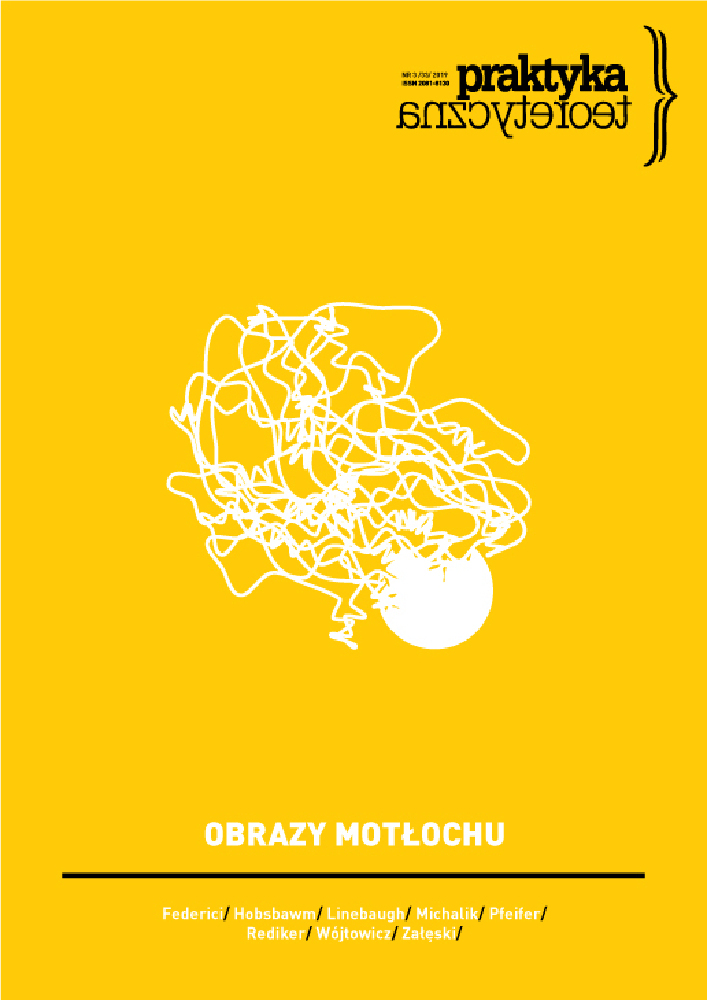Abstract
.References
Foucault, Michel. 1987. Historia szaleństwa w dobie klasycyzmu. Warszawa:PIW.
Foucault, Michel. 1994. Dits et écrits II (1970-1975). Paris : Gallimard Haraway, Donna i Tsing, Anna. 2016. Reflections on the Plantationocene:A Conversation with Donna Haraway and Anna Tsing. Madison: Edge Effects.
Hobsbawm, Eric. 2019. „Bandyta społeczny”. Tłum. M. Pospiszyl. Praktyka Teoretyczna 33(3).
Linebaugh, Peter i Rediker. Marcus. 2019. „Wielogłowa hydra”. Tłum. Łukasz Moll. Praktyka Teoretyczna 3 (33).
Marks, Karol i Fryderyk Engels. 1962. „Manifest komunistyczny.” W MED. t. 4. Warszawa: Książka i Wiedza.
Marks, Karol. 2011. 18 brumaire’a Ludwika Bonaparte. Warszawa: Wydawnictwo Krytyki Politycznej.
Olbracht, Ivan. 1953. Mikoła Szuhaj zbójnik. Tłum. Helena Gruszczyńska-Dubowa. Warszawa: Państwowy Instytut Wydawniczy.
Pfeifer, Kasper. 2019. „Oj skończy się nam, skończy nasze mordowanie”. Ludowe pieśni antyfeudalne, Ściegienny, Szela i możliwy wpływ
chłopskiej teologii emancypacyjnej na rabację galicyjską. Praktyka Teoretyczna 3(33).
Platon. 2010. Państwo. Tłum. Władysław Witwicki. Warszawa: PWN.
Polibiusz. 1957. Dzieje. T. 1. Tłum. Seweryn Hammer. Wrocław: Zakład Narodowy im. Ossolińskich.
Tsing, Anna. 2015. The Mushroom at the End of the World: On the Possibility of Life in Capitalist Ruins. Princeton, Oxford: Princeton University
Press.
Tsing, Anna. 2018. „Krnąbrne krawędzie: grzyby jako gatunki towarzyszące”. Tłum. M. Rogowska-Stangret. W Feministyczne nowe materializmy: usytuowane kartografie, Red. O. Cielemęcka i M. Rogowska-Stangret. Lublin: e-naukowiec.
License
“Theoretical Practice” seeks to put into practice the idea of open access to knowledge and broadening the domain of the commons. It serves the development of science, thinking and critical reflection. The journal is published in open-access mode under the CC-BY-NC-SA 4.0 license (detail available here: http://creativecommons.org/licenses/by-nc-sa/4.0/). Articles published in the journal may be freely distributed, stored, printed and utilized for academic and teaching purposes without restrictions.
They should not be, however, used for any commercial purposes or be reconstructed into derivative creations. Access to the journal may not be limited or offered for a fee by any third party.
Prospective authors are obliged to fill in, sign and send back the publishing contract compliant with the CC licencing. [PL.pdf, PL.doc, EN.pdf,EN.doc].
According to this contract, authors grant the journal a non-exclusive right to publish their work under the creative commons license (CC-BY-NC-SA 4.0) without any financial obligation on both sides of the contract.
Before submission authors should make sure that derivative materials they use are not protected by copyright preventing their non-commercial publication. Authors are responsible for any respective copyright violations.
